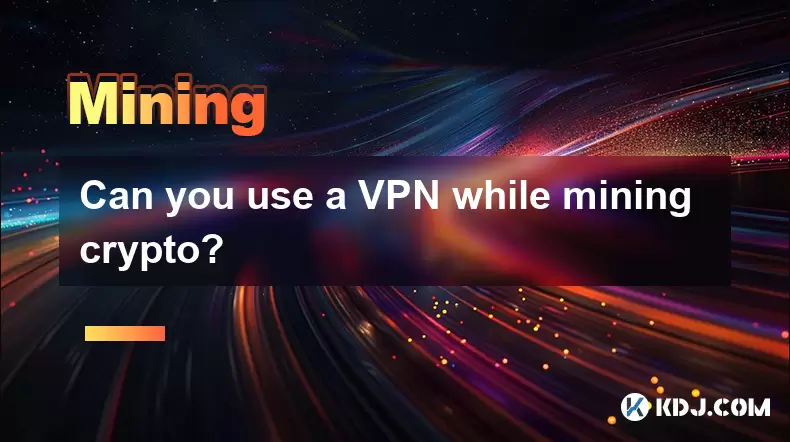-
 bitcoin
bitcoin $87959.907984 USD
1.34% -
 ethereum
ethereum $2920.497338 USD
3.04% -
 tether
tether $0.999775 USD
0.00% -
 xrp
xrp $2.237324 USD
8.12% -
 bnb
bnb $860.243768 USD
0.90% -
 solana
solana $138.089498 USD
5.43% -
 usd-coin
usd-coin $0.999807 USD
0.01% -
 tron
tron $0.272801 USD
-1.53% -
 dogecoin
dogecoin $0.150904 USD
2.96% -
 cardano
cardano $0.421635 USD
1.97% -
 hyperliquid
hyperliquid $32.152445 USD
2.23% -
 bitcoin-cash
bitcoin-cash $533.301069 USD
-1.94% -
 chainlink
chainlink $12.953417 USD
2.68% -
 unus-sed-leo
unus-sed-leo $9.535951 USD
0.73% -
 zcash
zcash $521.483386 USD
-2.87%
Can you use a VPN while mining crypto?
Using a VPN during cryptocurrency mining enhances security by masking your IP, protecting against DDoS attacks, and bypassing geo-restrictions, but choose a fast, reliable service to avoid performance issues.
Jul 15, 2025 at 10:42 pm

Understanding the Role of a VPN in Cryptocurrency Mining
Cryptocurrency mining involves solving complex mathematical problems to validate transactions and add them to the blockchain. This process requires a stable internet connection and often exposes miners to potential cyber threats. Using a Virtual Private Network (VPN) during mining can provide an additional layer of security by encrypting your internet traffic and masking your IP address.
A VPN routes your internet activity through a remote server, making it appear as if you're accessing the web from a different location. For miners, this can help protect against DDoS attacks and prevent third parties from tracking their real IP address. However, not all VPNs are suitable for cryptocurrency mining, especially those that throttle bandwidth or have unstable connections.
How a VPN Affects Mining Performance
When connecting to a mining pool or solo mining node via a VPN, latency and bandwidth become critical factors. High latency can reduce mining efficiency because the time taken to submit shares increases. Similarly, some VPNs compress data or limit throughput, which could affect hashrate performance, especially when using cloud mining services.
To mitigate these issues, it's essential to choose a high-speed, low-latency VPN provider that offers dedicated servers optimized for P2P and blockchain-related activities. Look for providers with unlimited bandwidth, no throttling policies, and servers located close to major mining pools or exchanges.
- Check if the VPN supports UDP protocols, which are commonly used in Stratum mining protocols.
- Ensure the encryption overhead is minimal, preferably using AES-128 instead of AES-256 for faster processing.
- Select a server geographically close to your mining pool to reduce ping times.
Security Benefits of Using a VPN While Mining
One of the primary reasons miners consider using a VPN is to enhance security. Mining operations can attract malicious actors looking to exploit vulnerabilities in your network. By routing your traffic through a secure tunnel, a VPN helps protect against unauthorized access to your mining rig or wallet information.
Additionally, some jurisdictions impose restrictions on cryptocurrency activities. A VPN allows miners to bypass geo-restrictions and connect to mining pools or exchanges that may be unavailable in their region. However, users should be cautious about violating local laws even while using a VPN, as anonymity does not equate to legality.
Another benefit includes masking your identity from ISPs and government agencies, which might monitor blockchain-related activities. This is particularly relevant for miners concerned about privacy and surveillance.
Potential Risks and Drawbacks of Using a VPN for Mining
While a VPN adds a layer of protection, it also introduces certain risks. Some free or poorly configured VPNS may leak your real IP address, compromising your anonymity. IP leaks can expose your mining activities to external observers and increase the risk of targeted attacks.
Moreover, unreliable VPNs can disconnect unexpectedly, causing your miner to lose connection to the pool temporarily. This interruption leads to rejected shares and reduced earnings over time. To avoid this, use a VPN with a kill switch feature that stops mining software if the connection drops.
Also, some mining pools explicitly prohibit the use of VPNs or proxy services, citing concerns over spamming, fraud, or botnet activity. Violating these terms could result in account suspension or banning from the pool.
Setting Up a Secure Mining Environment with a VPN
Configuring a VPN for cryptocurrency mining requires careful setup to ensure both performance and security. Begin by selecting a reputable VPN service that supports simultaneous connections across multiple devices, allowing you to protect your entire mining rig network.
Install the VPN client directly on the mining OS or configure it at the router level to cover all connected mining hardware. Use OpenVPN or WireGuard protocols for better security and compatibility with mining software.
Here’s how to set up a basic mining environment with a VPN:
- Choose a reliable mining-focused VPN provider like NordVPN, ExpressVPN, or ProtonVPN.
- Download and install the VPN app on your mining OS (e.g., Windows, Linux, or specialized mining distros).
- Connect to a server near your preferred mining pool.
- Launch your mining software (e.g., NiceHash, CGMiner) and point it to the pool URL and port.
- Monitor logs to ensure there are no connection errors or increased latency.
Frequently Asked Questions
Will using a VPN slow down my mining speed?Yes, depending on the VPN server distance, encryption strength, and protocol used, there may be a slight decrease in mining speed. Choosing a low-latency, high-bandwidth server can minimize this impact.
Can I get banned from a mining pool for using a VPN?Some mining pools have strict policies against proxy usage or anonymization tools, including VPNs. Check the pool’s terms of service before connecting through a VPN to avoid potential bans.
Is it legal to mine cryptocurrency with a VPN?Using a VPN itself is legal in most countries. However, if cryptocurrency mining is restricted or illegal in your jurisdiction, using a VPN won’t make it lawful. Always comply with local regulations.
Should I use a free or paid VPN for mining?Free VPNs often come with limitations such as bandwidth caps, slower speeds, and insecure protocols, making them unsuitable for mining. A paid, trusted VPN service ensures better performance, reliability, and privacy for mining operations.
Disclaimer:info@kdj.com
The information provided is not trading advice. kdj.com does not assume any responsibility for any investments made based on the information provided in this article. Cryptocurrencies are highly volatile and it is highly recommended that you invest with caution after thorough research!
If you believe that the content used on this website infringes your copyright, please contact us immediately (info@kdj.com) and we will delete it promptly.
- UAE Investor Secures Major Stake in Trump-Linked Crypto Firm Amidst Shifting Geopolitical Tides
- 2026-02-02 07:10:01
- Pepe Meme Coin: Navigating the Hype, Price Predictions, and Future Outlook in 2026 and Beyond
- 2026-02-02 07:05:01
- Blockchain Gaming's Quiet Revolution: Unpacking Latest Trends and Industry Insights Amidst Market Shifts
- 2026-02-02 06:30:01
- IPO Genie, Tokenization, and YouTubers: The Big Apple's Next Big Bet on Democratized Wealth
- 2026-02-02 06:40:02
- Aptos in a Bind: Downtrend Deepens, But a Brief Relief Bounce Looms Before the Next Plunge
- 2026-02-02 07:00:01
- Pi Network, ATL, and Community: Navigating the Currents of a Mobile-First Crypto Movement
- 2026-02-02 07:00:01
Related knowledge

How to Earn Passive Income with DePIN Mining? (New Trend 2026)
Feb 01,2026 at 12:40pm
Understanding DePIN Mining Mechanics1. DePIN mining relies on real-world infrastructure participation rather than computational hashing. Users deploy ...

How to Mine Vertcoin (VTC) on Your Gaming Desktop? (One-Click Miner)
Feb 02,2026 at 03:39am
Understanding Vertcoin's Mining Algorithm1. Vertcoin uses the Verthash algorithm, which is intentionally memory-hard and designed to resist ASIC domin...

How to Set Up a Quiet Mining Rig at Home? (Noise Reduction)
Feb 01,2026 at 11:00pm
Acoustic Enclosure Design1. Use rigid, dense materials such as MDF or acoustic-grade plywood for the enclosure walls to block mid-to-high frequency no...

How to Choose a Mining Pool with Lowest Fees? (Fee Comparison)
Feb 02,2026 at 02:39am
Understanding Mining Pool Fee Structures1. Pool operators charge fees to cover infrastructure, maintenance, and administrative costs. These fees manif...

How to Mine Bitcoin on Mac (M1/M2/M3)? (Software Tutorial)
Feb 01,2026 at 07:19pm
Understanding Bitcoin Mining on Apple Silicon1. Bitcoin mining relies on solving cryptographic puzzles using computational power, and Apple’s M1, M2, ...

How to Buy Used Mining Hardware Without Getting Scammed?
Feb 01,2026 at 08:00pm
Research the Seller's Reputation Thoroughly1. Check archived listings and feedback on platforms like Bitcointalk forums, Mining Hardware subreddits, a...

How to Earn Passive Income with DePIN Mining? (New Trend 2026)
Feb 01,2026 at 12:40pm
Understanding DePIN Mining Mechanics1. DePIN mining relies on real-world infrastructure participation rather than computational hashing. Users deploy ...

How to Mine Vertcoin (VTC) on Your Gaming Desktop? (One-Click Miner)
Feb 02,2026 at 03:39am
Understanding Vertcoin's Mining Algorithm1. Vertcoin uses the Verthash algorithm, which is intentionally memory-hard and designed to resist ASIC domin...

How to Set Up a Quiet Mining Rig at Home? (Noise Reduction)
Feb 01,2026 at 11:00pm
Acoustic Enclosure Design1. Use rigid, dense materials such as MDF or acoustic-grade plywood for the enclosure walls to block mid-to-high frequency no...

How to Choose a Mining Pool with Lowest Fees? (Fee Comparison)
Feb 02,2026 at 02:39am
Understanding Mining Pool Fee Structures1. Pool operators charge fees to cover infrastructure, maintenance, and administrative costs. These fees manif...

How to Mine Bitcoin on Mac (M1/M2/M3)? (Software Tutorial)
Feb 01,2026 at 07:19pm
Understanding Bitcoin Mining on Apple Silicon1. Bitcoin mining relies on solving cryptographic puzzles using computational power, and Apple’s M1, M2, ...

How to Buy Used Mining Hardware Without Getting Scammed?
Feb 01,2026 at 08:00pm
Research the Seller's Reputation Thoroughly1. Check archived listings and feedback on platforms like Bitcointalk forums, Mining Hardware subreddits, a...
See all articles










































































